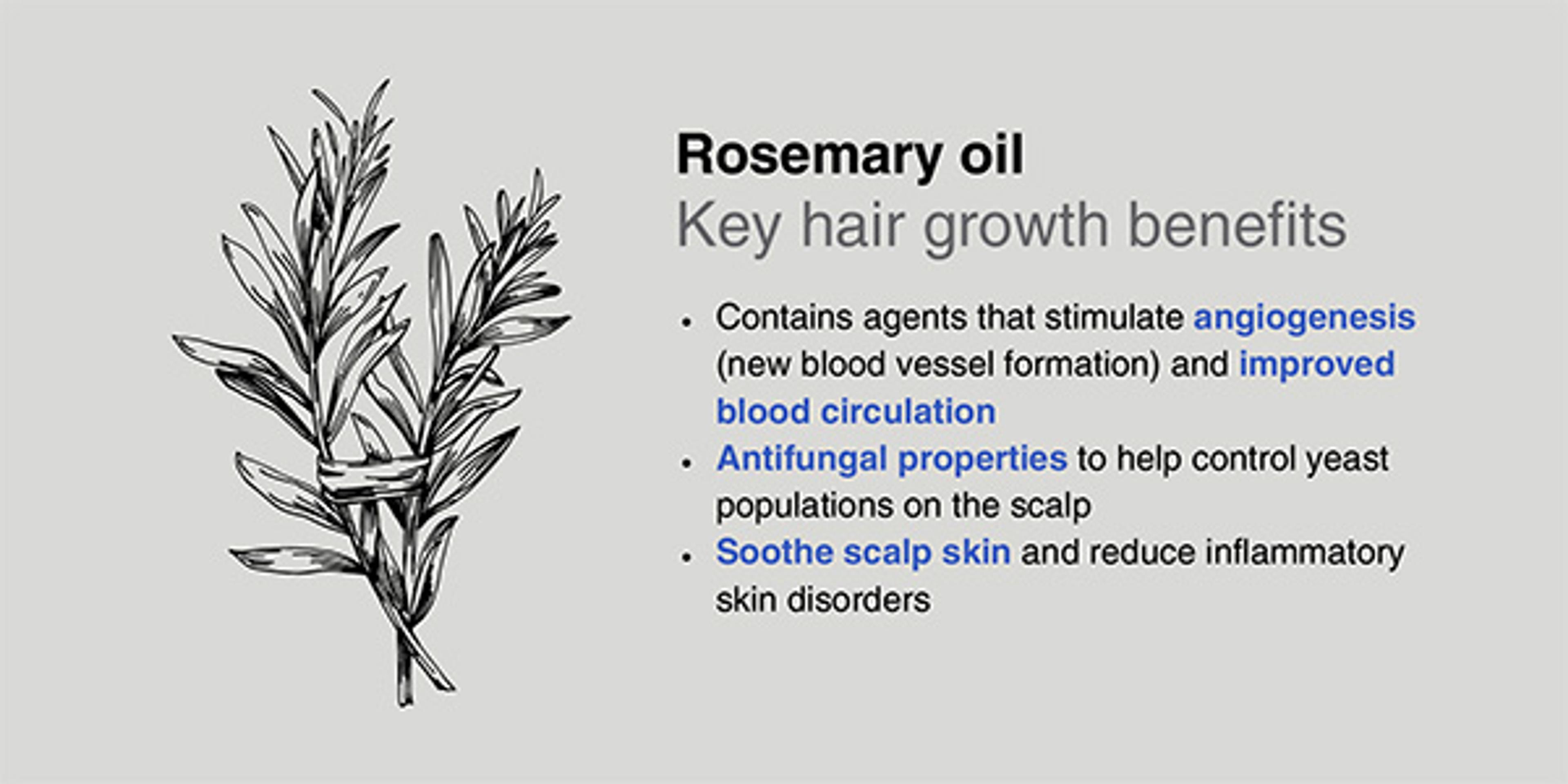You may be wondering if there are alternatives to using clinically-proven pharmaceutical treatments to target hair loss in men and women. Shampoos, conditioners and other hair care products that incorporate botanical ingredients purported to be good for hair won’t replace the need for medication (especially in advanced cases of hair loss), but may play a supporting role.
In this article, we’ll focus on a key ingredient in our DHT-Blocking Shampoo, rosemary oil. Early data has shown that rosemary oil could help promote scalp and hair follicle health and contains compounds such as antioxidants and anti-inflammatory agents to help maintain the integrity of scalp skin and hair. We’ll discuss the benefits of rosemary oil for hair growth and hair loss prevention and the possible mechanisms behind these processes.
What is rosemary oil?
Rosemary oil is derived from the rosemary (Rosmarinus officinalis) plant and has a variety of cosmetic and medicinal applications. It contains high amounts of carnosic and ursolic acids, compounds that give rosemary its antioxidant and anti-inflammatory properties. It also exhibits some antifungal activity. Historically, rosemary has also been used to treat certain skin, muscular and neurological conditions and is believed to assist with wound-healing and the effects of ageing (Macedo et al., 2020).
Rosemary oil for hair growth: What are the benefits?
Rosemary oil contains biologically active compounds that may assist with hair growth through the maintenance of optimal scalp health and direct stimulation of hair follicles.
A healthy scalp is the foundation to healthy hair. Antioxidants and anti-inflammatory agents present in rosemary oil may help keep cellular damage in check and support normal cell growth and division. In one animal study, topical application of carnosol, one of the active ingredients in rosemary oil, led to an improvement in skin lesions caused by eczema (Lee et al., 2017).

A different animal study demonstrated the potential for rosemary oil to stimulate angiogenesis (new blood vessel formation) and improved blood circulation (Abu-Al-Basal, 2010). This can lead to increased nutrient and oxygen exchange in the scalp and have a positive effect on hair growth and thickness. In one study that compared rosemary oil to 2% minoxidil (also believed to increase blood flow to the scalp), both agents were found to produce similar hair growth results after 6 months of regular application. Additionally, rosemary oil seemed to help reduce the frequency of scalp itchiness (Panahi et al., 2015).
Rosemary oil also seems to exhibit antifungal properties that could be important in controlling yeast populations on the scalp, including several species of Candida which have been implicated in the development of certain fungal infections of the scalp (Gauch et al., 2014).
Does rosemary oil prevent hair loss?
In addition to supporting scalp health and hair growth, rosemary oil may also help prevent hair loss via its DHT-blocking properties. Recall that male pattern hair loss (androgenetic alopecia) is triggered by elevated levels of the androgen DHT in genetically susceptible individuals.
One study examined the effects of rosemary oil on hair growth by using an alcohol-based solution on induced androgenic hair loss in rats. Researchers found that the solution promoted significant hair growth after 16 days compared to placebo. Additionally, an in-vitro analysis of 5-alpha reductase inhibition found that rosemary was able to inhibit approximately 80% of the enzyme (Murata et al., 2012).
Side effects of rosemary oil
Rosemary extracts and oil are safe to use as long as dosing instructions are followed. The herb can be prepared in a number of ways (e.g. dried and formulated into capsules or teas) but the pure oil is intended only for external use and must not be ingested. In some cases, rosemary can elicit an allergic reaction or cause irritation to the eyes or areas of broken skin. Individuals with epilepsy, high blood pressure, or who are pregnant should avoid pure rosemary oil.
How to use rosemary oil for hair growth
To make the most of its potential hair growth benefits, we’ve incorporated rosemary oil into our shampoo and conditioner for targeted topical application. These products can be used as part of your daily hair care routine and should be massaged lightly into the scalp for a few minutes each time. It’s an alternative to applying rosemary oil as a standalone serum, which can be messy.
Rosemary oil benefits: Takeaway
Rosemary oil may be beneficial to hair growth and scalp health and assist in the prevention of hair loss disorders such as androgenetic alopecia as a result of its antioxidant, anti-inflammatory and DHT-blocking properties.
However, research is still in its early stages and additional data is needed to substantiate its efficacy. It won’t replace pharmaceutical intervention in advanced cases of pattern hair loss but could be an effective adjunct therapy to an existing hair loss regime. Consider pairing our shampoo and conditioner with your topical treatment to maximize your hair growth potential.




